Please click a heading to learn more about each of the courses we offer...
Objectives

This 2-day qualification is for first aiders in a variety of sports and activity-related occupations. It is designed for people working in outdoor and recreation environments, as well as voluntary and community activities. Unit 1 is suitable for those requiring a qualification as an emergency first aider in the workplace.
2-day Activity First Aid
All training is fully accredited, and courses are offered in both closed (in-house) and open (available to all) formats...Course units
The qualification comprises two units (QAN: 603/2235/4), both of which must be completed to achieve the full Award:- First Aid Essentials
- Management of Illness and Injuries in Activities
Content and assessment
Delegates will be trained in and assessed on their knowledge of the following:- Primary survey and the recovery position
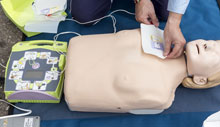 Cardiopulmonary resuscitation and the safe use of an automated external defibrillator (AED) – see photo
Cardiopulmonary resuscitation and the safe use of an automated external defibrillator (AED) – see photo- Choking
- Major bleeding and shock
- Major seizure
- Minor injuries
- Secondary assessment (top and toe survey)
- Injured limbs
- Head and spinal injuries
- Chest injuries
- Major illness
- Eye injuries
- Bites and stings
- Effects of heat and cold
Certification
This qualification is awarded by First Aid Awards (FAA), which is regulated by Ofqual in the United Kingdom. Part of the Regulated Qualifications Framework (RQF), the qualification is valid for three years and is delivered, assessed and quality assured in accordance with the Assessment Principles for Regulated First Aid Qualifications and the protocols set by the latest Resuscitation Council guidelines.It is strongly recommended that the delegate attends annual refresher training. Delegates will need to complete the full course again in order to requalify for a further three years.
Objectives
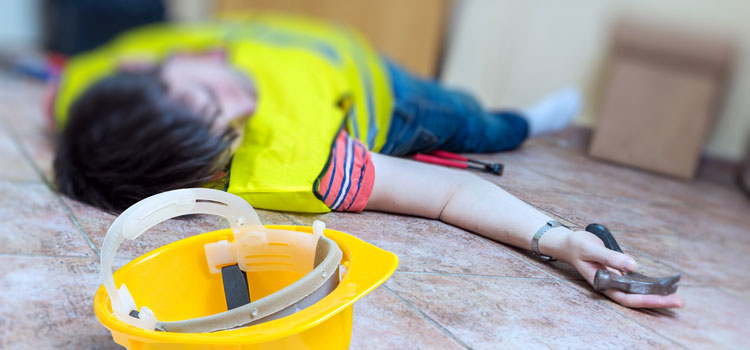
This 1-day qualification is for emergency first aiders in the workplace, and meets the requirements of the Health & Safety (First Aid) Regulations 1981. Delegates are trained to a level of competence required to manage a variety of first aid situations in a work environment.
The FAA Emergency First Aid at Work qualification is Unit 1 of the 3-day FAA First Aid at Work qualification. After successfully completing this course, delegates can progress to Unit 2 and the full FAA First Aid at Work Award.
1-day Emergency First Aid at Work
All training is fully accredited, and courses are offered in both closed (in-house) and open (available to all) formats. A non-accredited course is also available for those that do not require a regulated certificate...Course unit
The qualification comprises a single unit (QAN: 603/2080/1):- Emergency First Aid in the Workplace
Content and assessment
Delegates will be trained in and assessed on their knowledge of the following:- Primary survey and the recovery position
 Cardiopulmonary resuscitation and the safe use of an automated external defibrillator (AED) – see photo
Cardiopulmonary resuscitation and the safe use of an automated external defibrillator (AED) – see photo- Choking
- Major bleeding and shock
- Major seizure
- Minor injuries
Certification
This qualification is awarded by First Aid Awards (FAA), which is regulated by Ofqual in the United Kingdom. Part of the Regulated Qualifications Framework (RQF), the qualification is valid for three years and is delivered, assessed and quality assured in accordance with the Assessment Principles for Regulated First Aid Qualifications and the protocols set by the latest Resuscitation Council guidelines. The Health and Safety Executive (HSE) strongly recommends annual refresher training. Delegates will need to complete the full course again in order to requalify for a further three years.Upon expiry of the qualification HSE guidance states that the holder is no longer considered competent to act as a first aider in the workplace. It is therefore advisable to arrange requalification prior to expiry to ensure the workplace has sufficient qualified first aiders.
Objectives

This 3-day qualification is for first aiders in the workplace, and meets the requirements of the Health & Safety (First Aid) Regulations 1981. Delegates are trained to a level of competence required to manage a variety of first aid situations in a working environment.
3-day First Aid at Work
Course units
The qualification comprises two units (QAN: 603/2081/3) which delegates must complete to achieve the full Award:- Emergency First Aid in the Workplace
- Recognition and Management of Illness and Injury in the Workplace
Content and assessment
Delegates will be trained in and assessed on their knowledge of the following:- Primary survey and the recovery position
 Cardiopulmonary resuscitation and the safe use of an automated external defibrillator (AED) – see photo
Cardiopulmonary resuscitation and the safe use of an automated external defibrillator (AED) – see photo- Choking
- Major bleeding and shock
- Major seizure
- Minor injuries
- Secondary assessment (top and toe survey)
- Injured limbs
- Head and spinal injuries
- Chest injuries
- Major illness
- Burns and scalds
- Eye injuries
- Poisoning
- Anaphylaxis
- Diabetes
- Epilepsy
Certification
This qualification is regulated in the United Kingdom and is awarded by First Aid Awards (FAA), which is regulated by Ofqual. Part of the Regulated Qualifications Framework (RQF), the qualification is valid for three years and is delivered, assessed and quality assured in accordance with the Assessment Principles for Regulated First Aid Qualifications and the protocols set by the latest Resuscitation Council guidelines.The Health and Safety Executive (HSE) recommends annual refresher training (see below ).
2-day First Aid at Work Requalification
Health and Safety Executive (HSE) guidelines state that first aiders are no longer considered competent once their qualifications have expired. To requalify, delegates can attend a shortened 12-hour (2-day) requalification course:First Aid at Work Requalification courses are available for delegates whose FAW qualification is in-date or expired by less than three calendar months. Delegates with an FAW qualification less than one month beyond the expiration date will automatically be accepted. Delegates with an FAW qualification more than one month but less than three months beyond the expiration date will have to provide evidence that they have suitable experience – such as holding other FAW qualifications, being an active first aider, etc. This evidence may need to include a letter from the delegate’s employer. Delegates must provide a copy of their previous regulated FAW certificate.
The 2-day requalification course incorporates the same content and learning assessments of the 3-day course.
Objectives
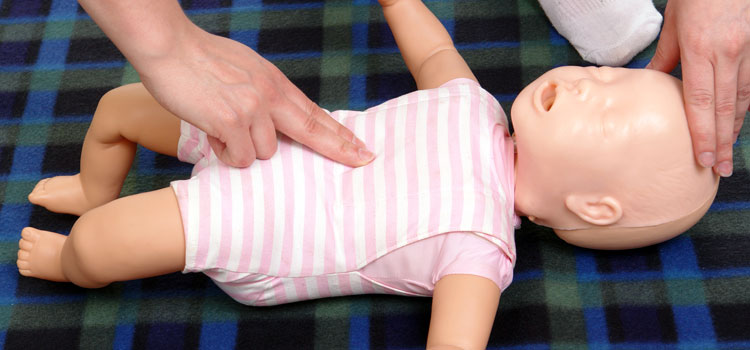
This 2-day qualification is for those with a responsibility for the professional care of children and babies. Delegates are trained to a level of competence required to manage a variety of paediatric first aid situations.
The qualification meets the requirements for first aid training in the Department for Education’s statutory framework for the Early Years Foundation Stage. EYFS covers children from 0 to 5 years in all schools, plus other Ofsted-registered providers– including childminders, preschools, nurseries and school reception classes.
2-day Paediatric First Aid
Course units
The qualification comprises two units (QAN: 603/0911/8) which delegates must complete to achieve the full Award:- Emergency Paediatric First Aid
- Managing Paediatric Illness, Injuries and Emergencies
Content and assessment
Delegates will be trained in and assessed on their knowledge of the following:- Role of the paediatric first aider
- Primary survey
- Resuscitation (CPR, including the safe use of an AED)
- Seizure
- Choking
- Wounds, bleeding and shock
- Minor injuries
- Recovery position
- Fractures
- Head, neck and back injuries
- Foreign bodies
- Diabetic emergencies
- Asthma
- Allergic reactions including anaphylaxis
- Meningitis
- Febrile convulsions
- Extreme cold and heat
- Electrical incidents
Certification
This qualification is awarded by First Aid Awards (FAA), which is regulated by Ofqual in the United Kingdom. It is part of the Regulated Qualifications Framework (RQF). It is delivered in accordance with the standards set by the Resuscitation Council (UK) 2015 Guidelines, and is valid for three years.It is recommended that the delegate attends annual refresher training. Delegates will need to complete the full course again in order to requalify for a further three years.
1-day Emergency Paediatric First Aid – FAA Level 3 Award
Objectives
This 1-day qualification is for those with a responsibility for the care of children and babies. Delegates are trained to a level of competence required to manage a variety of paediatric first aid conditions and incidents.
The qualification is Unit 1 of the 2-day FAA Paediatric First Aid qualification. After gaining this emergency first aid qualification delegates can then progress to taking Unit 2 – thereby achieving the full 2-day FAA Award in Paediatric First Aid.
It meets the requirements for first aid training in the Department for Education’s statutory framework for the Early Years Foundation Stage. EYFS covers children from 0 to 5 years in all schools, plus other Ofsted-registered providers – including childminders, preschools, nurseries and school reception classes.
Course unit
The qualification comprises one unit (QAN: 603/0912/X) which delegates must complete to achieve the full Award:- Emergency Paediatric First Aid
The minimum training time of 6 hours is delivered over a period of 1 day. There will never be more than 12 delegates in each training session.
Content and assessment
Delegates will be trained in and assessed on their knowledge of the following:- Role of the paediatric first aider
- Primary survey
- Resuscitation (CPR, including the safe use of an AED)
- Seizure
- Choking
- Wounds, bleeding and shock
- Minor injuries
- Recovery position
Delegates complete a workbook throughout the course, and assessment is through practical demonstration and oral questioning.
Certification
This qualification is awarded by First Aid Awards (FAA), which is regulated by Ofqual in the United Kingdom. It is part of the Regulated Qualifications Framework (RQF). It is delivered in accordance with the standards set by the Resuscitation Council (UK) 2015 Guidelines, and is valid for three years.It is recommended that the delegate attends annual refresher training. Delegates will need to complete the full course again in order to requalify for a further three years.
Objectives

These courses ares for first aiders not requiring accredited certification. Although non-accredited, delegates will receive a certificate from Viking Training, plus a course handout.
4-hour First Aid Awareness (FAA)
Content
The 4-hour course covers all topics included in the FAA First Aid Refresher (below), plus an additional hour for additional subjects specifically requested by delegates. Courses can be tailored to suit the needs of groups of delegates.3-hour First Aid Refresher (FAR)
Content
The Refresher course coverage includes:- Roles and responsibilities of the first aider
- Accident reporting and first aid kits
- Resuscitation (CPR, including the safe use of an AED)
- Unconscious casualty and the recovery position
- Choking – recognition and treatment
- Bleeding – control and wound dressing
- Effects and management of shock
Certification
This 3-hour First Aid Refresher course is non-accredited, but delegates receive a certificate from Viking Training, plus a course handout.The HSE strongly recommends annual refresher training for those who have completed a First Aid Awareness course.
Objectives
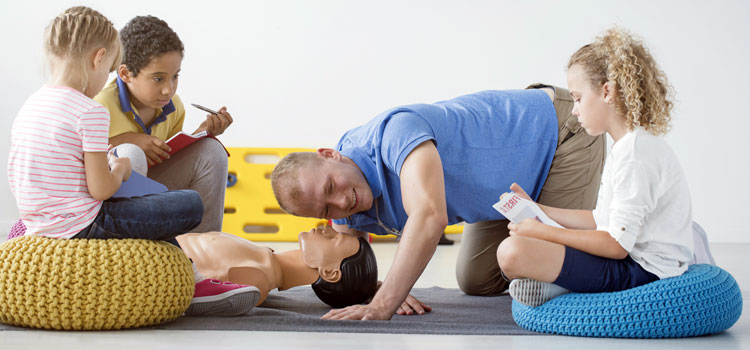
A basic introduction to first aid and defibrillation, the ‘Mini Medics’* course is aimed at children from 8 to 11 years old – although it is open to young people of all ages. Combining both educational and practical elements, it is intended to develop awareness of how to respond in an emergency when someone is injured or becomes unwell.
With courses scheduled to coincide with school holidays, this is an ideal way for parents and youth leaders to keep kids occupied, while increasing community capital.
3-hour Mini Medics
This is a non-regulated qualification – attendance is all that’s required. The course lasts 3 hours and is offered in both open (available to all) and closed formats. Closed courses are designed for a single school, Scouts/Brownies group, sports club, summer camp, etc.Ideally participants should be at least 8 years of age, but younger children may be accommodated by arrangement.
Content
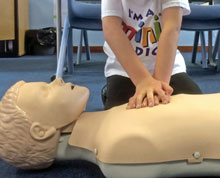 The course incorporates educational, theoretical and practical elements, and covers:
The course incorporates educational, theoretical and practical elements, and covers:
- What is first aid?
- Defibrillation
- The recovery position
- Resuscitation (CPR)
- Wounds and bleeding
- Shock
- Choking
- ‘DR ABC’
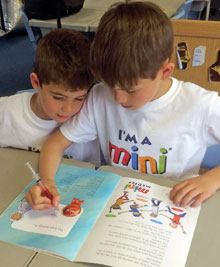 Asthma
Asthma- Safety
- First aid kits
- Communication – contacting the emergency services
Certification
A certificate of attendance is included in the 32-page fully illustrated Mini Medics workbook – provided free to all participants.* ‘Mini Medics’ is a registered trademark of InstructUK Resources Ltd.
Objectives

This course is for carers and community/healthcare workers in residential care homes and other sectors of the social care industry. It covers the safe moving and handling of adults and children – and includes the use of hoists and other aids, plus relevant legislation and guidelines.
1-day Moving & Handling
Training takes a full day (6 hours) and is offered as a closed course for up to 12 people at the customer’s own premises…Content
The course incorporates the following aspects of moving and handling people:- HSE guidelines and recommendations
- Moving and handling risk assessment
- Posture and ergonomics
- Use of stairs
- Use of bed rail
Certification
The course is non-accredited. Delegates will receive a Viking Training Solutions certificate and a course handout.3-hour Moving & Handling Refresher
Content
This is a shorter (3-hour) version of the Moving & Handling course (above) and features the same core content.Certification
The course is non-accredited. Delegates will receive a Viking Training Solutions certificate and a course handout.Objectives
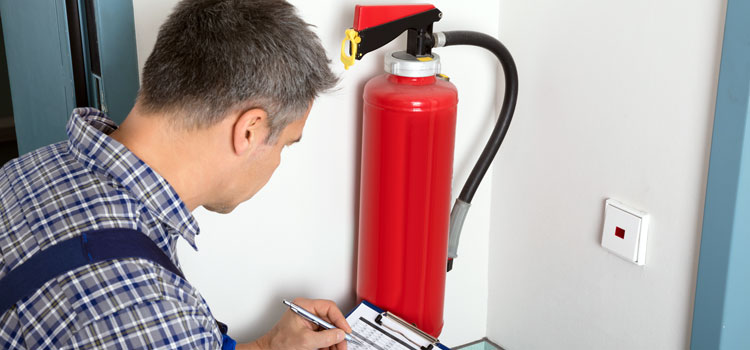
Course objectives are to increase awareness of fire safety, and to provide an understanding of the responsibilities and duties of the fire warden or marshall.
Employers are obliged by law to train staff in fire safety. The fire warden’s role is to ensure adequate fire safety arrangements by making a ‘suitable and sufficient’ risk assessment, and to lead the safe and swift evacuation of the premises in the event of a fire.
It is recommended that at least two fire wardens are appointed for each floor in every building – sufficient to ensure cover for holidays and sickness.
2-hour Fire Awareness
Content
This 2-hour course is aimed at staff from companies, institutions and public bodies of all sizes, and takes place at the customer’s own premises. It covers:- Legislative requirements
- Human behaviour in a fire
- Role of the fire warden
- Fire prevention – including practical tips on fire safety and equipment use
- Sources of ignition and identification of hazards
- Methods of escape
- Fire extinguisher types
- Putting out fires and use of fire extinguishers

